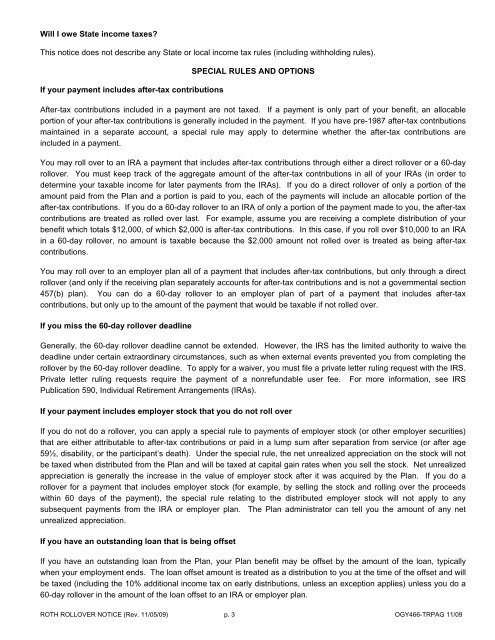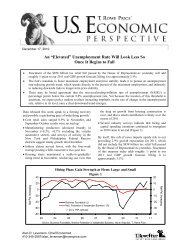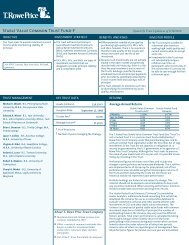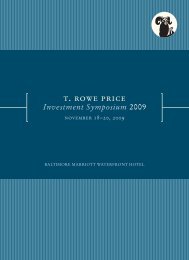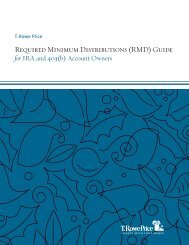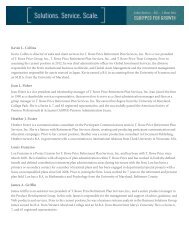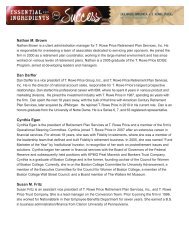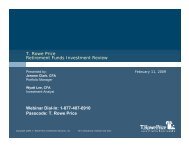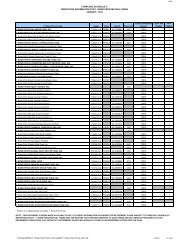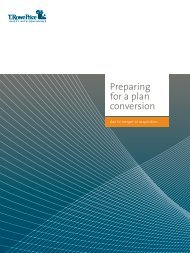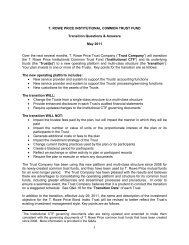YOUR ROLLOVER OPTIONS You are receiving this notice because ...
YOUR ROLLOVER OPTIONS You are receiving this notice because ...
YOUR ROLLOVER OPTIONS You are receiving this notice because ...
- No tags were found...
You also want an ePaper? Increase the reach of your titles
YUMPU automatically turns print PDFs into web optimized ePapers that Google loves.
Will I owe State income taxes?<br />
This <strong>notice</strong> does not describe any State or local income tax rules (including withholding rules).<br />
If your payment includes after-tax contributions<br />
SPECIAL RULES AND <strong>OPTIONS</strong><br />
After-tax contributions included in a payment <strong>are</strong> not taxed. If a payment is only part of your benefit, an allocable<br />
portion of your after-tax contributions is generally included in the payment. If you have pre-1987 after-tax contributions<br />
maintained in a separate account, a special rule may apply to determine whether the after-tax contributions <strong>are</strong><br />
included in a payment.<br />
<strong>You</strong> may roll over to an IRA a payment that includes after-tax contributions through either a direct rollover or a 60-day<br />
rollover. <strong>You</strong> must keep track of the aggregate amount of the after-tax contributions in all of your IRAs (in order to<br />
determine your taxable income for later payments from the IRAs). If you do a direct rollover of only a portion of the<br />
amount paid from the Plan and a portion is paid to you, each of the payments will include an allocable portion of the<br />
after-tax contributions. If you do a 60-day rollover to an IRA of only a portion of the payment made to you, the after-tax<br />
contributions <strong>are</strong> treated as rolled over last. For example, assume you <strong>are</strong> <strong>receiving</strong> a complete distribution of your<br />
benefit which totals $12,000, of which $2,000 is after-tax contributions. In <strong>this</strong> case, if you roll over $10,000 to an IRA<br />
in a 60-day rollover, no amount is taxable <strong>because</strong> the $2,000 amount not rolled over is treated as being after-tax<br />
contributions.<br />
<strong>You</strong> may roll over to an employer plan all of a payment that includes after-tax contributions, but only through a direct<br />
rollover (and only if the <strong>receiving</strong> plan separately accounts for after-tax contributions and is not a governmental section<br />
457(b) plan). <strong>You</strong> can do a 60-day rollover to an employer plan of part of a payment that includes after-tax<br />
contributions, but only up to the amount of the payment that would be taxable if not rolled over.<br />
If you miss the 60-day rollover deadline<br />
Generally, the 60-day rollover deadline cannot be extended. However, the IRS has the limited authority to waive the<br />
deadline under certain extraordinary circumstances, such as when external events prevented you from completing the<br />
rollover by the 60-day rollover deadline. To apply for a waiver, you must file a private letter ruling request with the IRS.<br />
Private letter ruling requests require the payment of a nonrefundable user fee. For more information, see IRS<br />
Publication 590, Individual Retirement Arrangements (IRAs).<br />
If your payment includes employer stock that you do not roll over<br />
If you do not do a rollover, you can apply a special rule to payments of employer stock (or other employer securities)<br />
that <strong>are</strong> either attributable to after-tax contributions or paid in a lump sum after separation from service (or after age<br />
59½, disability, or the participant’s death). Under the special rule, the net unrealized appreciation on the stock will not<br />
be taxed when distributed from the Plan and will be taxed at capital gain rates when you sell the stock. Net unrealized<br />
appreciation is generally the increase in the value of employer stock after it was acquired by the Plan. If you do a<br />
rollover for a payment that includes employer stock (for example, by selling the stock and rolling over the proceeds<br />
within 60 days of the payment), the special rule relating to the distributed employer stock will not apply to any<br />
subsequent payments from the IRA or employer plan. The Plan administrator can tell you the amount of any net<br />
unrealized appreciation.<br />
If you have an outstanding loan that is being offset<br />
If you have an outstanding loan from the Plan, your Plan benefit may be offset by the amount of the loan, typically<br />
when your employment ends. The loan offset amount is treated as a distribution to you at the time of the offset and will<br />
be taxed (including the 10% additional income tax on early distributions, unless an exception applies) unless you do a<br />
60-day rollover in the amount of the loan offset to an IRA or employer plan.<br />
ROTH <strong>ROLLOVER</strong> NOTICE (Rev. 11/05/09) p. 3 OGY466-TRPAG 11/09


